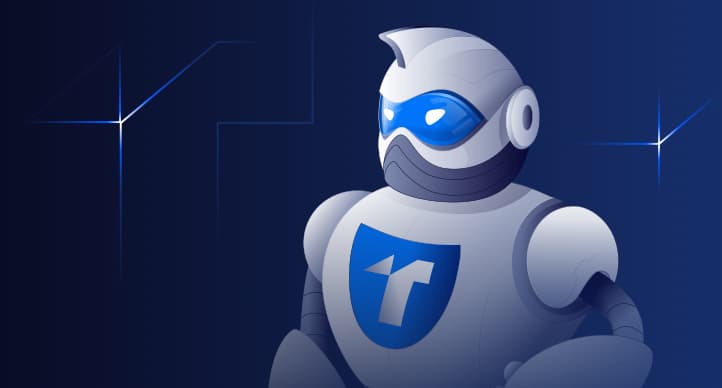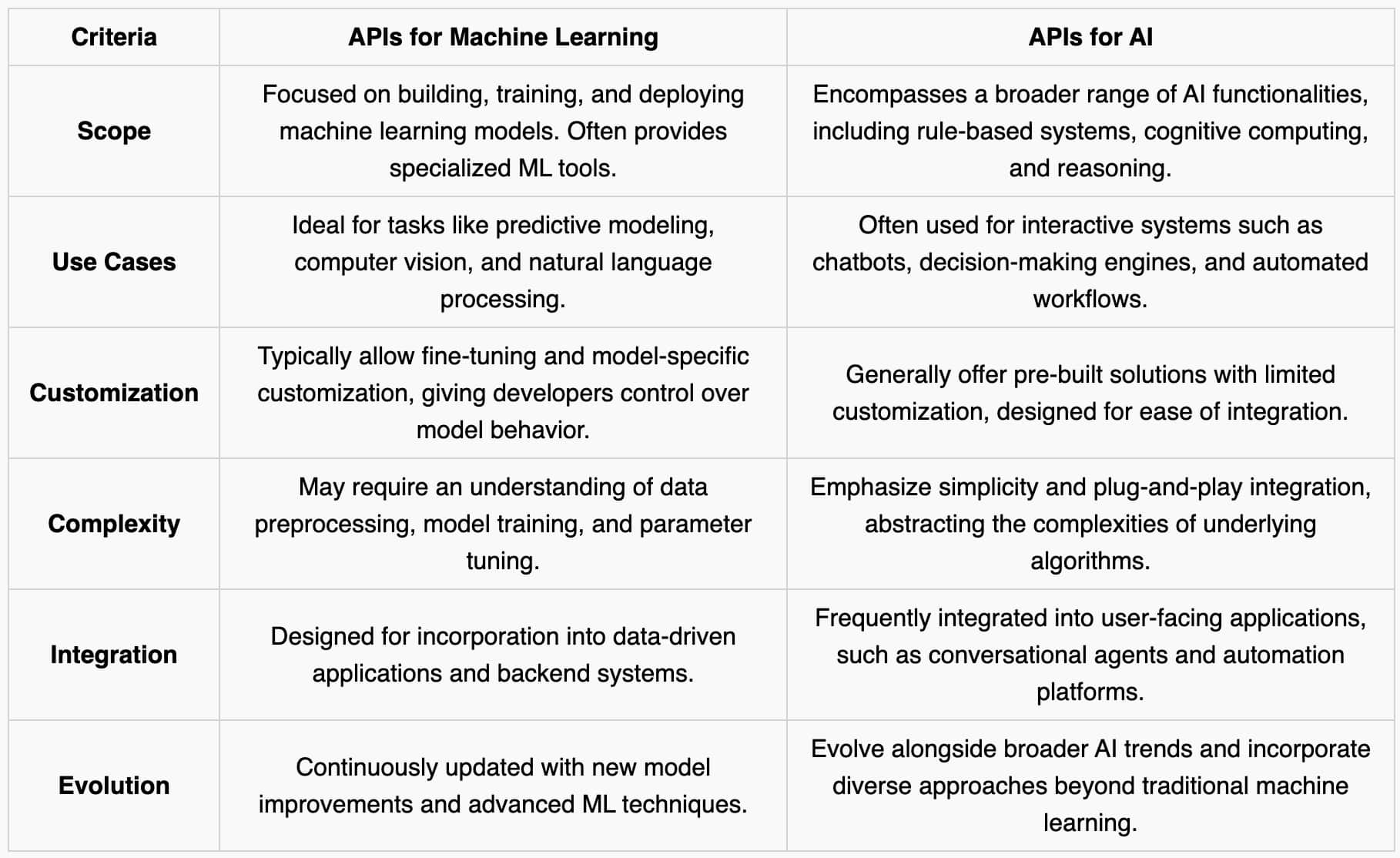By industry
By initiatives
By industry
By initiatives
AI | Mar 21, 2025 | 12 min read | By Savan Kharod | Reviewed by David Blažević

Savan Kharod works on demand generation and content at Treblle, where he focuses on SEO, content strategy, and developer-focused marketing. With a background in engineering and a passion for digital marketing, he combines technical understanding with skills in paid advertising, email marketing, and CRM workflows to drive audience growth and engagement. He actively participates in industry webinars and community sessions to stay current with marketing trends and best practices.
Machine learning APIs are changing the way developers integrate AI into applications. Instead of building models from scratch, developers can now access pre-trained AI models through simple API calls, making adding capabilities like speech recognition, image processing, and predictive analytics easier.
The demand for AI-driven applications is skyrocketing across industries like finance, healthcare, e-commerce, and cybersecurity, to name a few. However, training and deploying machine learning models is complex and requires vast amounts of data, computing power, and specialized expertise.
Machine learning APIs solve this challenge by offering scalable, ready-to-use AI solutions, allowing businesses to focus on innovation rather than infrastructure.
Need real-time insight into how your APIs are used and performing?
Treblle helps you monitor, debug, and optimize every API request.
Explore Treblle
Need real-time insight into how your APIs are used and performing?
Treblle helps you monitor, debug, and optimize every API request.
Explore Treblle
Machine learning APIs provide a fast, scalable, and cost-effective way to bring AI into applications. Some even include AI-powered assistants that help streamline interactions—learn more about AI API assistants and how they enhance API workflows. Here’s why ML APIs are an essential tool for modern development:
By using machine learning APIs, companies can integrate AI features quickly, reduce costs, and stay competitive in an increasingly AI-driven world. Want to maximize efficiency? Discover the 8 benefits of using AI in your API workflows.
Integrating advanced machine learning capabilities into your applications has never been easier, thanks to these 10 Best APIs for Machine Learning. If you’re looking for a broader range of AI-driven solutions, check out our guide on the best AI APIs.
This curated selection of ML APIs provides robust, scalable, and secure solutions that simplify deploying an api for machine learning model into your project.
Whether you’re deploying a flask api for machine learning model or leveraging a powerful google api for machine learning, these tools span a wide range of functionalities, from natural language processing to computer vision:
The OpenAI API offers developers access to cutting-edge language models such as GPT-4, making it one of the Best APIs for Machine Learning. It enables sophisticated natural language understanding and generation for content creation, conversation, and code assistance.
As a leading example of ML APIs, it simplifies the integration of advanced AI into various applications without the need for building models from scratch.
Pros:
Cons:
Google Cloud’s suite of AI services is a robust example of a google api for machine learning, offering a comprehensive range of pre-trained and customizable models. These APIs cover functionalities such as image and speech recognition, natural language processing, and data analysis.
Built on Google’s robust infrastructure, these ML APIs empower developers to create intelligent applications that scale effortlessly.
Pros:
Cons:
IBM Watson Discovery is designed to extract meaningful insights from large volumes of unstructured data. This api for machine learning models excels in cognitive search and content analytics, helping developers build powerful search engines and data analysis tools.
Its robust natural language processing capabilities make it a strong contender among the Best APIs for Machine Learning in text analytics.
Pros:
Cons:
Microsoft Azure AI Services provide diverse pre-built APIs for machine learning model deployment, covering vision, speech, language, and decision-making. These services offer a comprehensive platform that enables developers to integrate sophisticated AI features into cloud applications.
As one of the leading ML APIs, Azure facilitates pre-trained solutions and custom model training for enterprise-level projects.
Pros:
Cons:
NLP Cloud is a specialized ML API focused exclusively on natural language processing tasks. It provides high-performance, pre-trained models for sentiment analysis, entity recognition, summarization, and more. This dedicated api for machine learning model processing allows developers to integrate advanced NLP capabilities into their applications without managing the complexities of model training.
Pros:
Cons:
Amazon SageMaker is a fully managed service that empowers developers and data scientists to quickly build, train, and deploy machine learning models. This api for machine learning model development supports the entire ML lifecycle within the AWS ecosystem.
Additionally, developers can combine SageMaker endpoints with a flask api for machine learning model deployment, allowing custom web service integration.
Pros:
Cons:
TensorFlow Serving is an open-source framework designed specifically for serving machine learning models in production. This API for machine learning model deployment offers a flexible and efficient system for managing multiple models and versions simultaneously.
It is often paired with a flask API for machine learning models to expose custom endpoints for real-time predictions, making it a favorite among developers who need seamless integration.
Pros:
Cons:
PyTorch API, maintained by Facebook, is a widely used open-source machine learning framework known for its flexibility and ease of use in research and production. This platform enables developers to build and experiment with deep learning models and quickly prototype innovative solutions.
It also supports the creation of a custom API for machine learning model deployment, which can be wrapped in a flask API for machine learning models for real-world applications.
Pros:
Cons:
Eden AI aggregates multiple ML APIs under a single unified interface, simplifying the integration of various AI services. It provides a one-stop solution for tasks across vision, text, and translation domains.
This consolidated approach is beneficial for developers seeking the Best APIs for Machine Learning without the hassle of managing multiple vendor relationships.
Pros:
Cons:
Clarifai API is a leading deep learning platform for computer vision and AI automation, recognized among the Best APIs for Machine Learning in visual recognition. It provides extensive image and video analysis features, enabling applications such as automated content moderation, image tagging, and visual search.
Clarifai’s robust framework simplifies the deployment of an api for a machine learning model focused on visual data.
Pros:
Cons:
Need real-time insight into how your APIs are used and performing?
Treblle helps you monitor, debug, and optimize every API request.
Explore Treblle
Need real-time insight into how your APIs are used and performing?
Treblle helps you monitor, debug, and optimize every API request.
Explore Treblle
The landscape of ML APIs is continuously evolving as new trends emerge to simplify and enhance AI integration. However, many developers still face obstacles when working with AI-driven APIs, so check out the common API challenges in AI and how to overcome them.
Modern advancements are improving model performance and reducing the complexity of deployment while ensuring data privacy and accessibility for developers of all skill levels.
Understanding the distinctions between APIs for Machine Learning and APIs for AI can help you select the right tool for your project. If you’re building autonomous AI-driven applications, our API guide for AI agents explores how APIs enable intelligent decision-making systems.
While these terms are sometimes used interchangeably, they have unique characteristics that cater to different needs. The table below highlights key differences across several criteria:

Choosing the right ML API is crucial to unlocking the full potential of AI in your projects. By carefully evaluating factors like performance, ease of integration, customization, pricing, and security, you can select a solution that aligns perfectly with your business needs.
Need real-time insight into how your APIs are used and performing?
Treblle helps you monitor, debug, and optimize every API request.
Explore Treblle
Need real-time insight into how your APIs are used and performing?
Treblle helps you monitor, debug, and optimize every API request.
Explore Treblle
 AI
AIReducing Time to First Integration is more than speed; it’s a key metric. In this post, discover 6 proven methods, backed by AI and observability, to simplify onboarding, cut friction, and lower integration time without sacrificing reliability.
 AI
AIModern APIs are powerful but difficult to integrate. Poor documentation, fragile code, and tool sprawl slow teams down. This article explores how AI is transforming API integration—automating onboarding, testing, and governance to boost speed, reliability, and scale.
 AI
AILLMs are calling your APIs, but they don’t always follow the rules. From subtle JSON mismatches to silent data pollution, probabilistic outputs can quietly break your backend. Here’s why contracts matter, and how to enforce them in real time.